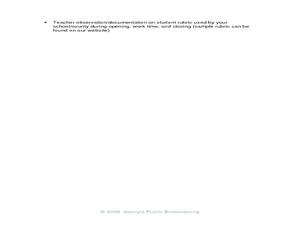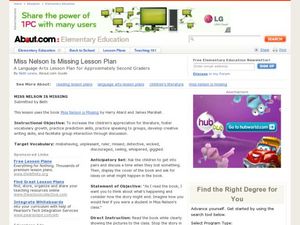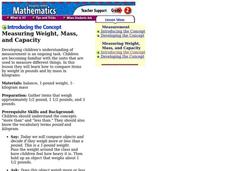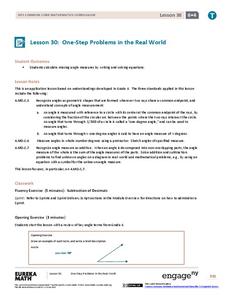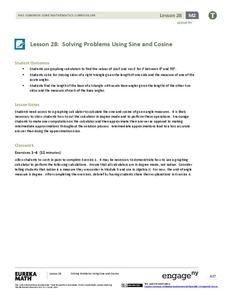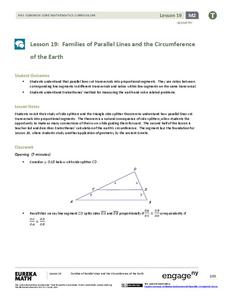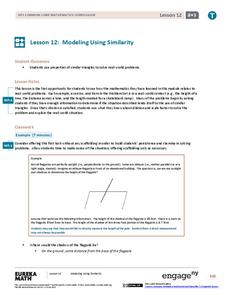Curated OER
Measurement: Cylinders
Math scholars observe and demonstrate how to calculate the surface area and volume of cylinders. They analyze pictures of various cylinders on a handout, solve problems on two worksheets independently, and discuss the answers to the...
Curated OER
How Long is a Hot Dog? Weight, Weight! Don't tell me!
Primary learners participate in activities that help them explain how different things are measured. They create their own access number chart.
Curated OER
One Size Fits All, Part 1
Can you tell how tall someone is just by looking at their feet? In this activity, young mathematicians measure their height, arm span, and foot size, graph their findings, and answer questions about how these measurements are related....
Curated OER
How Big Is A Humpback Whale?
Students explore humpback whales. For this humpback whale lesson, students determine the actual size of humpback whales and use diagrams to identify the major features of the humpback whale.
Curated OER
Twice the Rice, or More?
Students review the metric and customary systems of measurement. In groups, they experiment with rice to discover the difference between the two systems. They record their observations on a worksheet and examine how capacity differs. To...
Curated OER
Measure Up! Capacity Chart
Students experiment with various containers to explore standard units of liquid capacity. They create a diagram to illustrate the liquids and units of measurement that each container holds. Each student is then challenged to compute...
Curated OER
The Weight of Primates
Second graders practice their problem solving skills. In this addition and subtraction skills lesson, 2nd graders solve word problems that require them to find differences and sums. This lesson features the use of a video titled "Blossom...
Curated OER
Miss Nelson is Missing Lesson Plan
Second graders listen to the story Miss Nelson is Missing by Harry Allard and James Marshall. In this literature lesson plan, 2nd graders predict the story's ending with drawings and discussions within groups.
Curated OER
Measuring Length and Width
Second graders practice measuring length and width of objects in inches. For this measurement lesson, 2nd graders use a ruler to measure the length and width of a chair, desk, and book. Students view a video, "Math Investigations II," to...
Curated OER
Measuring in Inches
First graders discover that there are two types of standard measurement using a ruler: centimeters and inches. They use the inches side to measure pipe cleaner "worms"; straigthening them out and laying them on the end of the ruler with...
Curated OER
Measuring Weight, Mass, and Capacity
Second graders investigate the concept of measuring weight, mass, and capacity. In this measurement worksheet, 2nd graders compare items using the words "more than" or "less than." They predict whether an item weighs more or less than a...
Curated OER
Everyday Measurements
Fourth graders practice measuring items with unconventional methods. In this measurement prediction lesson plan, 4th graders estimate the length of items a teacher brings to class and record their predictions. Students measure the...
Curated OER
Simple Measurements
Students determine the height of objects using shadows. In this math lesson, students discus methods of finding the height of items without directly measuring. Students measure shadows and figure the actual height of the object.
Curated OER
Measuring Object Length on a Number Line
Students demonstrate knowledge that you can measure objects using a subtraction number sentence when the item to be measured is not aligning to zero. In this lesson, a video clip is used to emphasize this idea further.
EngageNY
One-Step Problems in the Real World
Mirror, mirror on the wall, which is the fairest resource of them all? Individuals write and solve one-step equations for problems about angle measurement, including those involving mirrors. Both mathematical and real-world problems are...
Curated OER
Are You Full of Hot Air?
Explore the concept of measuring and recording circumference. In this physical science and measurement lesson, young learners blow up balloons, measure the circumference, and record the data on an interactive graphing website.
EngageNY
Secant Angle Theorem, Exterior Case
It doesn't matter whether secant lines intersect inside or outside the circle, right? Scholars extend concepts from the previous lesson to investigate angles created by secant lines that intersect at a point exterior to the circle....
EngageNY
Percent Error Problems
Individuals measure a computer monitor and determine how accurate their measures are. The eighth segment in a series of 20 introduces the concept of percent error. Pupils find the percent error of their measurements and discuss the...
EngageNY
Solving Problems Using Sine and Cosine
Concepts are only valuable if they are applicable. An informative resource uses concepts developed in lessons 26 and 27 in a 36-part series. Scholars write equations and solve for missing side lengths for given right triangles. When...
EngageNY
Families of Parallel Lines and the Circumference of the Earth
How do you fit a tape measure around the Earth? No need if you know a little geometry! Pupils begin by extending their understanding of the Side Splitter Theorem to a transversal cut by parallel lines. Once they identify the proportional...
EngageNY
Modeling Using Similarity
How do you find the lengths of items that cannot be directly measured? The 13th installment in a series of 16 has pupils use the similarity content learned in an earlier resource to solve real-world problems. Class members determine...
Curated OER
Pumpkin Play
Have you ever examined a pumpkin and estimated the number of lines it has? In this math lesson, students count the actual number of lines, record and graph the results. They investigate the circumference, weight and buoyancy of the...
Curated OER
Number Addition Race
Practice basic addition facts and measuring skills. For this addition and measurement lesson, students are provided with drywall tape and work in groups of four at a long table. Partners take turns generating addends and marking the...
EngageNY
Modeling with Polynomials—An Introduction (part 1)
Maximizing resources is essential to productivity. Class members complete an activity to show how math can help in the process. Using a piece of construction paper, learners construct a box with the maximum volume. Ultimately, they...








